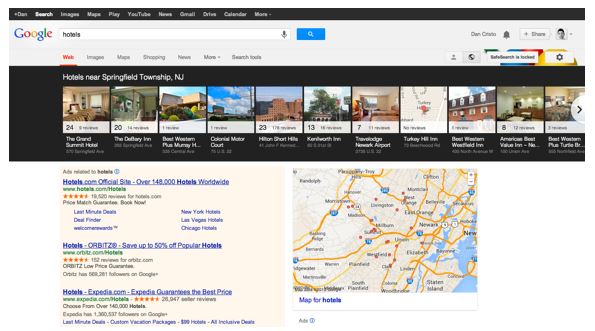The day every SEO has feared has finally arrived. Google has successfully pushed organic search results below the fold for certain popular queries, leaving only paid ads and Google’s own properties. How should SEO’s respond to this?
Google’s Destroying SEO

Take a look at the Google screen shot above. The popular search query “hotels” has 3 main areas:
- An image carousel that, when clicked, performs another search on Google.
- Paid ads, which now occupies what was the organic search space above the fold.
- Google Maps, which sits above more paid ads.
Any SEO who sees this should be outraged! It seems Google is systematically trying to destroy our profession, replacing it with lower quality results that boost their own bottom line.
Before you rally the troops, take a deep breath and realize that this is only happening on a very small percentage of queries right now. It will be some time before Google can move the organic results completely off the first page for most queries.
Let’s not kid ourselves either. Google WILL continue to suppress organic results in favor of paid as long as consumers will tolerate it. Consumers will tolerate it as long as the quality of the paid results is up to par with organic listings. Why do you think Google placed such an emphasis on quality score in its AdWords program?
Adding Insult to Injury
It is kind of ironic that Google seems to be on the path of destroying SEO, especially when you consider its role in their success.
For the past decade, SEO’s helped brands make their sites search engine friendly — giving Google unrestricted access to their content.
SEO’s convinced brands to create great content so Google’s users would have a better search experience.
SEO’s showed brands that paid and organic can work together to achieve maximum results.
SEO’s understood the importance of Google+ and urged brands to setup and use the network.
Now, Google has made it clear that organic results will play second fiddle to ads. What a shame, but what we can we do?
Taking Action
As an SEO, I see three possible responses to this trend:
1) Play Along
Ultimately, Google’s search experience is controlled by the user. If user engagement drops off because of the proliferous paid ads, Google will ease up and organic will take the forefront again.
For users to actually stop using Google in favor of Bing, the search experience on Bing would need to be much better than Google’s. This could happen if Bing focused on organic search results, Google focused on paid search results, and Bing’s organic results were significantly higher quality than the paid results on Google.
This scenario would make Google push paid marketers to further improve the quality of their listings and landing pages. In turn, it will also require organic quality to improve.
This back and forth would continue until the cost to improve the quality of a page exceeds the ranking benefit, at which point the paid and organic quality scores will more or less be so similar that the user doesn’t care if it’s a paid or organic listing and Google wins.
This is essentially the path we’re on today. This option just ensures that outcome.
2) Revolt
I’m always amazed at the power large groups of people can wield, yet they almost never work together to realize that power.
Consider modern day society. For the most part, governments provide support programs for the people, but hold the power. However, when people are pushed too far, they revolt, and the government can be overthrown. This can happen online as well.
Google provides sites with traffic, much in the same way governments provide support programs. If enough people rely on those programs, then the majority votes to keep the government in power. Likewise, brands and site owners rely so much on the traffic Google provides, they vote to keep Google in power (by following Google’s webmaster guidelines).
What would happen if all of a sudden all websites blocked Google’s crawlers? In theory, Google’s results would quickly begin to degrade, users would look for alternate search engines and Google would start to lose ad dollars. The revenue loss would spook Wall Street and Google’s stock would nosedive. With the value of the company crashing, Google would start cutting back on its non-core products, slowing their innovation and creating the opportunity for other companies to step up.
The goal of course is not to take down a company as much as it is to shift the balance of power back to the masses. It would help Google see that search engines should serve content creators, not the other way around.
3) Diversify:
Diversification is a hybrid of the first two options – playing along and revolting. It’s essential to continue optimizing for Google as best we can, while looking to other sources to supplement the traffic loss.
Social networks, Q&A sites, and vertical engines all have search bars. Your content and products on places like Facebook, Quora, Amazon, YouTube, App marketplaces, and Pinterest can drive significant brand awareness and sales. Why not diversify your time and money so that your risk of total Google reliance is reduced.
We’re essentially putting ourselves in the mindset of, “If Google went away tomorrow, then what would we do?” without actively trying to make Google go away.
It’s still very much search engine optimization, it’s just a broader look at where searches are being done.
What will you do?
Google has fired the first shot: Organic listings are being suppressed, which forces brands to spend more money on paid search, lowering ROI on both paid and organic. It’s bad for searchers, it’s bad for brands, and it’s bad for search professionals.
We don’t HAVE to just sit by and watch. We’re free to play along, revolt or diversify. What will you do?




![[SEO, PPC & Attribution] Unlocking The Power Of Offline Marketing In A Digital World](https://www.searchenginejournal.com/wp-content/uploads/2025/03/sidebar1x-534.png)